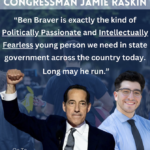Proponents of private school vouchers have been making the same arguments for over a decade now. Near the top of the list is the notion that using public funds to pay for private school tuition offers students at under-performing public schools a better chance at a quality education.
What usually goes unsaid, however, is that private schools are free of state regulation and accountability. That’s what makes them “private.” In a public school system, there’s a series of checks and balances, and rigorous rules governing curricula and teacher standards, but private schools can do what they please. If parents are unhappy with what happens in a public school, they can go to superintendents and school-board members. If they’re unhappy with what happens in a private school, they can take their money elsewhere.
In 2004, a Republican Congress and Republican president created the first-ever federally-funded voucher program, in Washington, D.C. Like with all voucher schemes, there was little oversight and no accountability — Congress just handed over the money to unregulated private schools, in the hopes that everything would work out fine.


















